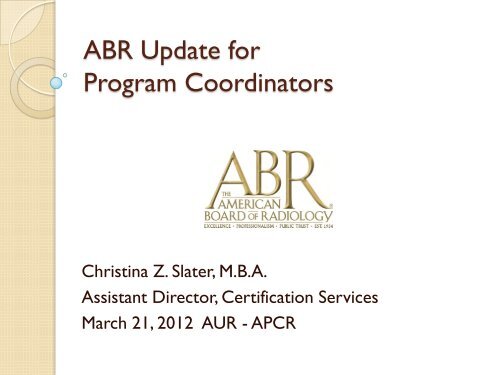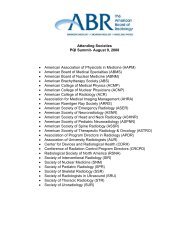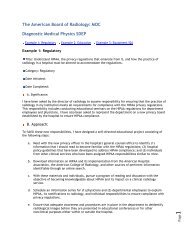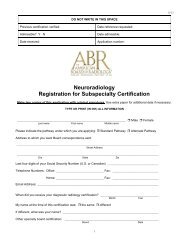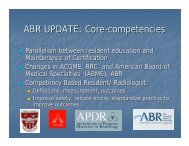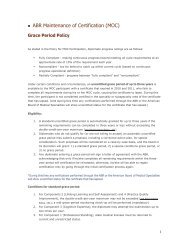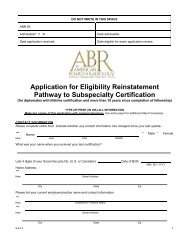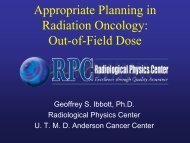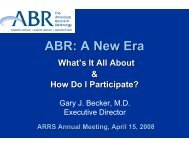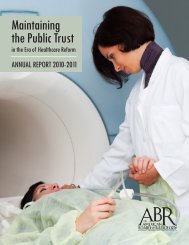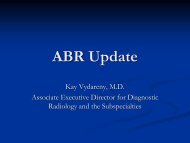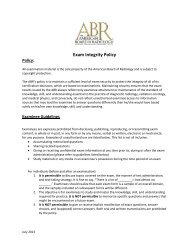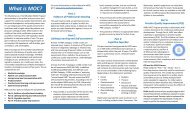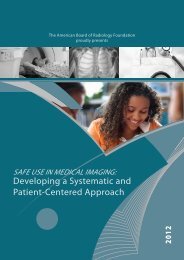X - The American Board of Radiology
X - The American Board of Radiology
X - The American Board of Radiology
You also want an ePaper? Increase the reach of your titles
YUMPU automatically turns print PDFs into web optimized ePapers that Google loves.
ABR Update forProgram CoordinatorsChristina Z. Slater, M.B.A.Assistant Director, Certification ServicesMarch 21, 2012 AUR - APCR
Today’s Topics• ABR Diagnostic <strong>Radiology</strong> InitialCertification Examinations• MOC process for new diplomates• New Initiatives• Personal Database – Online verifications
ABR INITIALCERTIFICATIONEXAMINATIONS
Diagnostic <strong>Radiology</strong> Examinations– Current vs Future• July 1, 2009: Last resident class to enterunder the current written and oral examparadigm• July 1, 2010: First resident class to enterunder the future Core and CertifyingExams
Future EOF Exam Sequence
Future EOF Examinations• CORE Examination◦ Administered after 36 months <strong>of</strong> training◦ Administered at ABR Chicago and TucsonExam Centers◦ 1 st Core Exam in October 2013• 2-day process –• Day 1 - Register in AM, Part 1 administered in PM• Day 2 – Part 2 administered in AM• 5.25 hours each day◦ Pass, fail or condition results
Future EOF Examinations• Core Examination◦ Study guide is available on the ABR website.◦ Online practice examination will be online atthe end <strong>of</strong> 2012.◦ <strong>The</strong> exam will be <strong>of</strong>fered twice a year startingin 2014.
Future EOF Examinations• Certifying Examination◦ Administered 15 months after end <strong>of</strong>residency training◦ Administered at ABR Chicago and TucsonExam Centers◦ 1 st Certifying Exam: October 2015
Future EOF Examinations, continued• Certifying Examination◦ Exam will be 5 hours in length.◦ Exam will be <strong>of</strong>fered twice a year.◦ Core Exam must be passed before eligible totake the Certifying Exam.
Core Examination CategoriesBreast Cardiac GI MSK Neuro Peds ThoraxRepro/Endo Vascular Q#CT 60IR 60MR 60NM/Molecular 60Rad/Fluoro 60US 60Physics 110Safety 60Q# 60 60 60 60 60 60 60 60 60
Core Exam Pilot Exam Schedule• Pilot Exam 2012 (2012 oral exam participants)◦ Two sessions reserved; one clinical category is assigned, and onecategory will be self selected.◦ Pass the Pilot category = pass Oral exam category◦ All examination categories will be available.• Pilot Exam 2013 (2013 third-year residents)◦ Full Core Exam – follows same schedule as the Core Exam◦ Summer 2013◦ Detailed feedback will be provided prior to Octoberexamination.◦ Currently planned as a one-time event.
Certifying Examination◦ Practice-pr<strong>of</strong>iled, modular exam• Five modules total• Candidates choose three modules from 13 areas <strong>of</strong> clinicalpractice.• + two required modules:• Noninterpretive Skills• Essentials <strong>of</strong> Diagnostic <strong>Radiology</strong>◦ Pass or Fail ONLY, no conditioned exams
Planned Core and CertifyingExamination ScheduleEOF exam administrationsDate Core Exam Certifying ExamOctober 2013June 2014October 2014June 2015October 2015 X XFebruary 2016June 2016XXXXXOctober 2016 X XExaminations will be administered at the ABR Chicago & TucsonExam Centers.X
Planned Written/Oral ExaminationPhase-outSeptember 2010Resident class which began in July 1, 2009Physics Clinical Oral - FullSeptember 2011 X XSeptember 2012 X XJanuary 2013* X XMay /June 2013XXOral-ConditionedNovember 2013 X XMay/June 2014 X XNovember 2014 X X*only for those in their last year <strong>of</strong> training
2012 Re-applications for theWritten ExaminationOption 1 - Written examination2 Options availablePhysics Clinical Oral - FullSeptember2013 X XMay /June2014 X XNovember2014 X XOral-Conditioned Core CertifyingOption 2 - Core ExamOctober2013 XOctober2015 X
2012 – Re-applications for the OralExaminationOral examination2012 reapplicationMay/June 2013Oral Full examXOral conditionedexamNovember 2013 X XMay/June 2014 X XNovember 2014 X X
MAINTENANCE OFCERTIFICATION FORNEWLY CERTIFIEDDIPLOMATES
<strong>The</strong> ABR is one <strong>of</strong> 24 ABMSmember boards.• <strong>The</strong> <strong>American</strong> <strong>Board</strong> <strong>of</strong> MedicalSpecialties (ABMS), is a not-for-pr<strong>of</strong>itorganization, which assists 24 approvedmedical specialty boards in thedevelopment and use <strong>of</strong> standards in theongoing evaluation and certification <strong>of</strong>physicians.• For other boards and general information,see: www.abms.org
Four Components <strong>of</strong> MOCCommon to All 24 ABMS <strong>Board</strong>s• Pr<strong>of</strong>essional Standing – State Licensure• Lifelong Learning and Self Assessment –CME, SAMs• Cognitive Expertise – Examination• Performance in Practice - Practice QualityImprovement (PQI) projects
MOC Component #1Pr<strong>of</strong>essional Standing• Diplomates are required to maintainactive, current, valid, and unrestrictedlicenses relevant to all locations <strong>of</strong>practice.
MOC Component #2Lifelong Learning and Self-Assessment• Continuing Medical Education (CME)credits• Self Assessment Modules (SAMs)
MOC Component #3Cognitive Expertise• Documentation <strong>of</strong> cognitive expertiserequires a passing score on a computerbased,practice-pr<strong>of</strong>iled exam.• <strong>The</strong> exam may be taken multiple times ifnecessary.
MOC Component #4Practice Quality Improvement (PQI)• <strong>The</strong> ABR has developed newcomprehensive PQI guidelines forindividuals and groups.• PQI is intended to improve the quality <strong>of</strong>care delivered, reduce errors, andimprove safety.• PQI projects serve to engage diplomatesin the proper application <strong>of</strong> qualityimprovement principles.
Fee Deferment – Benefit forFirst-year Diplomates• Only available the first year after attainingcertification, and is automatically given.• <strong>The</strong> invoice will be sent in January, but diplomatescan elect to defer payment until March 1 <strong>of</strong> thefollowing year w/o incurring a late fee.• Fee deferment allows for payment <strong>of</strong> year 1 andyear 2 fees in year 2.• Must sign in to PDB and agree to MOCparticipation.• Fees may be paid online.• Implemented with January 2012 invoices.
Personal Database (PDB) forDiplomates• Critical for new diplomates to log on totheir PDB at www.abronline.org• Only method for the diplomate tocommunicate MOC participation to theABR• Primary source for the ABR to measurediplomate MOC progress• Primary source for ABR to report MOCparticipation
Personal Database (PDB), cont’d.• PDB must be continuously updated bydiplomates.• Enroll in society-developed CME gatewayat www.cmegateway.org to track societybasedSAMs and CME.• Diplomate must verify all societyinformation regarding CME and SAMs iscorrect.
ABR Optional Programs• Practice Quality Reporting System◦ CMS incentive – payment incentive forparticipating in MOC and completing more thanis required per CMS guidelines.• Group MOC◦ Allows for administrative oversight <strong>of</strong> MOCrequirements for diplomates within a practice orinstitution.• Focused Practice Pilot Programs◦ Special recognition for MOC diplomates• Brachytherapy• Cardiac CT
NEW ABMS INITIATVES
Public Reporting – ABMS Initiative• Begins August 1, 2012• Either meeting MOC requirements or notmeeting MOC requirements• Binary status only on ABMS site◦ Additional information available via link toABR website
<strong>Board</strong> Eligibility – ABMS Mandate• What is ABMS-defined <strong>Board</strong> Eligibility?• It is the period <strong>of</strong> time that must begin at thecompletion <strong>of</strong> accredited residency training andextend for no less than three years and no morethan seven years.• ABR Candidate <strong>Board</strong> Eligibility◦ Diagnostic <strong>Radiology</strong> and Radiation Oncology– effective January 1, 2012• <strong>Board</strong> eligibility period begins at the end <strong>of</strong> trainingand terminates after six years.
NEW ABRINITIATIVES
Why Continuous Certification?• Meets the increased focus <strong>of</strong> externalstakeholders, such as credentialers, payors,government, and regulatory bodies.• MOC participation is continuous, ratherthan intermittent .• Prevents waiting until year 7 to beginMOC requirements; avoids puttingcertificate at risk.• Aligns with ABMS public reporting.
Exam Security Attestations• Department Chair• Program Director• Program Coordinator• Residents
ABR Program Coordinator ExamSecurity Attestation◦ I have received and read the ABR Exam Security Policy, and Ihave viewed the Exam Security Video.◦ I understand the guidelines, responsibilities, and penalties asstated in the policy.◦ I have discussed with the program director the implications <strong>of</strong>the policy, including permissible behavior, prohibited behavior,and specific responsibilities <strong>of</strong> the program coordinator topromote permissible behavior and to help stop prohibitedbehavior..◦ I pledge to uphold the ABR Exam Security Policy by notfacilitating the documentation or sharing <strong>of</strong> recalled ABRexamination questions by residents/candidates or others in theDepartment <strong>of</strong> <strong>Radiology</strong>/Imaging Sciencesat____________________.◦ I will report any violations to the residency program directorand/or department chair.
ABR Candidate Exam SecurityAttestation◦ I have received and read the ABR Exam SecurityPolicy, and I have viewed the Exam Security Video.◦ I understand the guidelines, responsibilities, andpenalties as stated in the policy.◦ I pledge to honor and abide by the ABR ExamSecurity Policy.◦ I will not engage in the memorization, recording, orsharing <strong>of</strong> recalled questions from ABR examinations.◦ I understand that if I fail to adhere to the ABR ExamSecurity Policy, one or more <strong>of</strong> the consequenceslisted in the policy may apply to me and/or myresidency training program.
ABR PERSONALDATABASE FORRESIDENCY PROGRAMS
Personal Database (PDB)• <strong>The</strong> PDB is the means by which the ABRtracks residents throughout theirresidency training program.• It also allows for communication betweenthe ABR and the user.• <strong>The</strong> program director, program chair, andprogram coordinators all have access tospecific program information.
Program overview• Program Summary - This will list all residents in yourprogram who have been added to the ABR personal database(PDB) (residents who began their residency prior to July2008 will not be listed).• Residents in Program - Used to add the new PGY2residents in your program to our database. Once residentshave been added, they are then contacted by the ABR withinstructions on how to create an account and register withthe ABR.• Program Info - This page will display your program'sinformation, as well as exam results for residents in yourprogram. (<strong>The</strong>se reports are confidential and should NOT beshared with residents.)
Program Overview• Exam Info – This information is ONLYfor residents who are participating inexams.• Personal Info - Contact informationcan be updated, and passwords can bechanged.
Verification <strong>of</strong> training timeline• Requests for verification <strong>of</strong> training will be sent toprograms in January and must be completed byMarch 30.• Verification <strong>of</strong> training is required for each year <strong>of</strong>residency training.• All program directors and program coordinatorswill receive a reminder email in mid February.• <strong>The</strong> ABR requires the final year <strong>of</strong> training beprojected during the resident’s PGY4 year.• Refer to the ABR PDB program coordinatormanual at http://www.theabr.org/ic-dr-progdir
Future Plans for RotationVerifications• In the future, rotation verifications willonly be required for the following:◦ 12 weeks <strong>of</strong> mammography◦ 4 months <strong>of</strong> nuclear medicine◦ Maximum <strong>of</strong> 16 months in any one specialty◦ Leave <strong>of</strong> absence and vacation can equal nomore than 120 days during the resident’s 4years.
Resident PDB Registration Process• Registrations are accepted between July 1and November 30.• Establish an ABR personal database (PDB)account.• Complete and submit an online registrationform.• Mail or fax a copy <strong>of</strong> the internshipcertificate.• If applicable, mail or fax a copy <strong>of</strong> theECFMG certificate and MD diploma.
Resident PDB• Residents should confirm/update theircontact information periodically.• Annual payments may be made on thePDB.• Residents can view their exam results.
Resident PDB• <strong>The</strong> PDB will be used more frequently forABR communications.• <strong>The</strong> goal is to eliminate paper examinvitations and mailed exam resultsletters.• <strong>The</strong> PDB will be the resident’s conduit tothe ABR.• Newly certified diplomates should findthe transition to MOC seamless.
Contact information• Sarah Betourney, Candidate ServicesSpecialist◦ sbetourney@theabr.org• Linda Morris, Candidate Services Specialist◦ lmorris@theabr.org• Christina Slater, MBA, Assistant Director,Certification Services◦ cslater@theabr.org
Web Information• <strong>The</strong> <strong>American</strong> <strong>Board</strong> <strong>of</strong> <strong>Radiology</strong>◦ www.theabr.org• Personal database (PDB) log-in page◦ www.abronline.org• Current exam dates and locations◦ http://www.theabr.org/all-dates
Questions?


